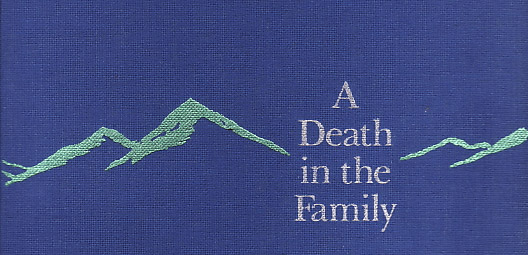
“You can see the grown man’s 5 o’clock shadow,” Will Blythe wrote this past weekend in The New York Times Book Review, “darkening the smooth cheeks of such baby prose.” The prose thus tarred is that of James Agee.
Note the excellence and clarity of Blythe’s metaphor. He has found a terse and vivid way to say that Agee’s attempts to artfully present the perceptions of a child, of childishness, were marred by artifice, were too-transparently those of an adult author attempting to “do” childishness. The passage Blythe presents to corroborate his critical take appears in both of the wildly different editions of Agee’s novel A Death in the Family. Rufus, the one son in Agee’s titular family, is listening to his mother Mary sing the song “Swing Low, Sweet Chariot.” As she does, the narration of the novel presents Rufus’s thoughts about the lyrics. This technique—in which third person narration is infused with the perceptions of one of the story’s characters—is sometimes called free indirect style:
A cherryut was a sort of a beautiful wagon because home was too far to walk, a long long way, but of course it was like a cherry, too, only he could not understand how a beautiful wagon and a cherry could be like each other, but they were.
The child hears “chariot” and, ignorant of the word, hears it as “cherry-ut,” building it from existing materials. Agee is attempting to present the drama of comprehension and knowledge-building as an explicit activity, one which, were we properly seated in a cerebrum, we could witness.
Blythe, though, is a fidgety spectator of this sort of theater. He’s seen it before. “[T]he early chapters,” he writes, “embody the development of Rufus’s childhood consciousness, at times in painful imitation of James Joyce’s Portrait of the Artist as a Young Man.” Blythe does not quote from Portrait, but if he had, he might have used this to show the technical similarity:
He crept about from point to point on the fringe of his line, making little runs now and then. But his hands were bluish with cold. He kept his hands in the side pockets of his belted grey suit. That was a belt round his pocket. And belt was also to give a fellow a belt. One day a fellow said to Cantwell:
—I’d give you such a belt in a second.
Yes, Joyce’s attention to the child’s attention to language (“And a belt was also to give a fellow a belt”) is meant to intimate the processes of becoming a “language animal” (Terry Eagleton’s shorthand for humans), a process that gains importance, in the case of Joyce’s Stephen Dedalus or Agee’s Rufus Follett, when we would understand that each is destined to make language–the makings of language–his life. Blythe finds that Agee’s attempt (“the grown man’s 5 o’clock shadow [etc]”) threatens to say less about Rufus the listener and more about Agee the reader and writer.
This is good criticism—good in its clarity, its founding of a judgment in a presentable detail—if not adequate in its judgment. “Even by Agee’s era,” Blythe suggests, “singsong prose as an embodiment of a child’s innocence must have been an exhausted trope.” Tricky, the ticketing of tropes as “exhausted.” Once one begins to issue such broad summonses, anything can be judged tiresome: Do we really need another father-and-son story? Another death-of-a-loved-one tale? Do we need to use alliteration to mark a moment’s lyricism; do we benefit from photographs interspersed in a novel; should we forego quotation marks to distinguish dialogue in favor of modernist doodles like em-dashes?
Nothing, in a novel, is needed, whether technical or material. Rather, a novel can admit of anything, breaking with convention or recycling it. Naturally, the success of such admissions depends on the talent of the writer. Blythe, I suspect, would agree, and would say only that the weaker parts of Agee’s enterprise depended too heavily and too transparently on the endeavor of another author. This is fair enough, as a point of view. Whereas the exhausted trope argument is, itself, a trope exhausted–novels would be nowhere without them.
































































































